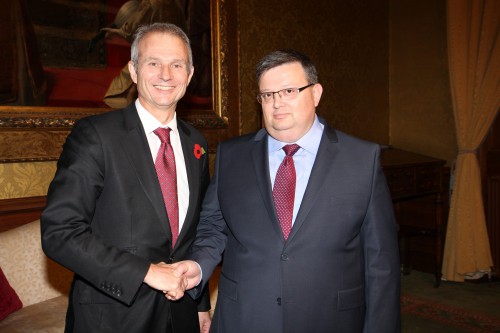11th November 2014
Prosecutor General Visits London
By guest blogger Sarah Riley, Deputy Head of Mission at British Embassy Sofia.
This blogpost follows Bulgarian Prosecutor General’s visit to the UK from 4 to 7 November 2014.

Last week I spent two days in London with Prosecutor General Sotir Tsatsarov, on his official visit to look at all aspects of the criminal justice system in the UK. It was a fascinating and intensive trip. As a new arrival in Sofia – I only arrived in September – it’s impossible to miss the fact that reform of the justice system is a hot topic in Bulgaria. So this visit was an excellent opportunity for me to learn more about the challenges faced by those working to reform it, and to hear Mr Tsatarov’s views on how reform might be achieved.
As I’m not a lawyer, it was also fascinating to hear from experts – both British and Bulgarian – about how some really difficult issues can be tackled. Over hours of meetings in the Crown Prosecution Service, Her Majesty’s Revenue and Customs, the National Crime Agency, the Supreme Court, Her Majesty’s Inspectorate of Constabulary and the Ministry of Justice, Mr Tsatsarov and his UK interlocutors discussed and debated a wide range of issues, shared experiences and lessons learned (including some difficult ones), and looked forward to future cooperation. After each meeting, Mr Tsatsarov identified a number of ideas which it might be possible to implement in Bulgaria quickly, and others which might be for the longer-term.
So what were the issues discussed? Everything from the smallest practical details of witness protection to dealing with corrupt individuals within the system, from tackling organised crime to more efficient digital management of case files, from high level legislation to communicating with the public. Mr Tsatsarov told Director of Public Prosecutions Alison Saunders that he was particularly impressed that the Code for Prosecutors is published on the Crown Prosecution Service’s website. This means there is no mystery about how the prosecution works in England and Wales – if a member of the public wants to know what standards and regulations govern prosecutors, he or she can read them (there are two key questions for Prosecutors in England and Wales when they decide whether or not to prosecute: is there enough evidence for there to be a realistic chance of conviction, and is it in the public interest to bring the case to court?). Over lunch with Lord Mance in the Supreme Court, Mr Tsatsarov was also fascinated to hear that cases are streamed live and that the Court is on Twitter, bringing the activity of the highest court in the land direct to the public.
What struck me throughout the visit was that, despite the huge range of issues and complex terminology and jargon, what everyone was talking about was actually very simple: it’s all about making the public feel confident, that there is strong oversight of the judicial process, justice is working for them and to keep them safe. This can happen in all sorts of ways: criminals (organised and others) can be arrested and convicted; the institutions that administer the law can exercise constant vigilance to ensure they are free from corruption, not influenced by the strong and the powerful, and work the same for everyone; and those institutions can constantly communicate with the public about what they’re doing and why and how they’re doing it, and about their successes and their mistakes.
In the last meeting of the visit, Minister for Europe David Lidington underlined the UK’s willingness to support Bulgarian efforts to reform its justice system so that it is robust, meets the highest standards, and enjoys public confidence. I know there will be a lot of work for the Embassy in Sofia and the UK institutions taking forward the wide ranging cooperation arising from this visit, in addition to the ongoing strategic and operational bilateral cooperation.
As for me, much as I’ve enjoyed a quick trip back to London, I’m also glad to be back in Sofia and looking at the changing seasons on beautiful Mt. Vitosha from the windows of the Embassy.